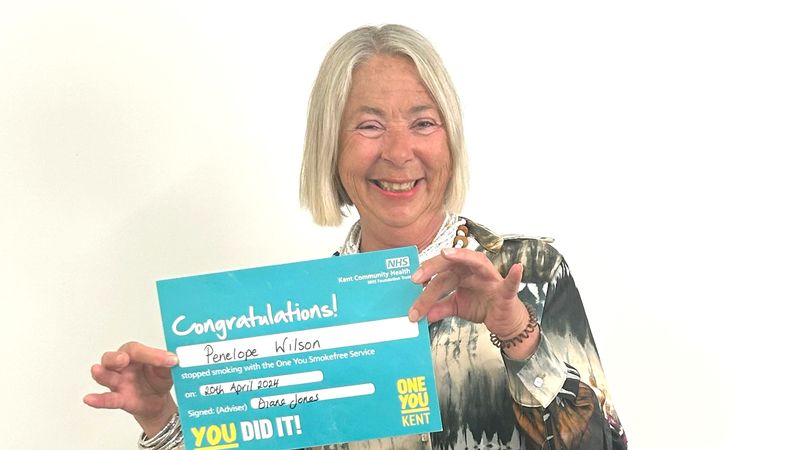In fact, stubbing out cigarettes in national quit smoking month is one of the best decisions you can make for your health and wellbeing.
Stopping smoking will:
- improve your health: reduce the risk of heart disease, stroke, lung cancer, and other serious illnesses
- save you money: smoking is expensive. Every week you can pocket around £38, and close to £2000 a year
- boost your quality of life: you'll have more energy, breathe easier, and smell better!
In more good news, not smoking for just 28 days makes it five times more likely you will give up the habit for good.
You’re also at least five times less likely to light up with the right help.
For advice on stopping smoking visit kent.gov.uk/smokefree. Here you can find out how the NHS Quit Smoking App and the KCC-commissioned One You Kent Smokefree service can support you on your quit journey.
Penny Wilson,who in her own words smoked for ‘a staggering nearly 50 years’, says she really wished her younger self had known it wasn’t cool to smoke and had known how addictive it would be.
The retired journalist from Eastry, near Sandwich, was so reliant on cigarettes that she carried on smoking even when diagnosed with melanoma, a type of skin cancer, in one eye, and then on her nose.
It was only when a free NHS Lung Health Check discovered a node on one of her lungs that had the potential to turn cancerous that Penny, already left blind in her affected eye, decided to try quitting with One You Kent.

One You Kent adviser Tracey says nicotine replacement products help people break away from smoking addiction. One You also provide behavioural support to help people change the routines that lead them to smoking.
Penny, a veteran of numerous failed attempts to quit over five decades of smoking, explains: “If it had been made difficult for me I could never have done this.
“They had every tool to help me. I had the most fantastic counsellor. I feel so much better. I’m no longer wheezing. I’m not coughing. I don’t smell of smoke all the time. I actually feel proud that I’ve climbed Everest.”
On advice to people thinking about quitting, Penny says: “Do it. Don’t even think about it but really you have to join this service to get help. I really felt like I was in good hands.”
Just over one in 10 Kent residents continue to smoke (11.4%) compared to a very slightly higher 11.6% in the UK.*

“...smoking still remains the number one cause of preventable death and disease”
Kent County Council Acting Director of Public Health, Jess Mookherjee, said: “While the number of people smoking continues to fall nationally and locally, smoking still remains the number one cause of preventable death and disease.
“It also affects the health of others around you and costs you and the NHS money.
“I can’t think of better reasons to give quitting a go with our free expert services this Stoptober.”

“The large majority of smokers wish they had never started”
KCC Cabinet Member for Adult Social Care and Public Health, Dan Watkins, added: “As anyone who has ever smoked will tell you, smoking is incredibly addictive, yet it’s not an addiction anyone wants. The large majority of smokers wish they had never started.
“As our case study with Penny explains so well, the key to overcoming what for her was a challenge equal to climbing Mount Everest is to not try to get by on just willpower alone. Instead, get free professional support. So to find the best quit route for you, visit kent.gov.uk/smokefree.”
* Please note these figures were updated on 2 October 2024 to match the latest available data published by the Office for National Statistics.




